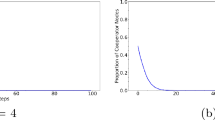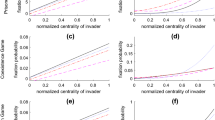Abstract
Lurking is a complex user-behavioral phenomenon that occurs in all large-scale online communities and social networks. It generally refers to the behavior characterizing users that benefit from the information produced by others in the community without actively contributing back to the production of social content. The amount and evolution of lurkers may strongly affect an online social environment, therefore understanding the lurking dynamics and identifying strategies to curb this trend are relevant problems. In this regard, we introduce the Lurking Game, i.e., a model for analyzing the transitions from a lurking to a non-lurking (i.e., active) user role, and vice versa, in terms of evolutionary game theory. We evaluate the proposed Lurking Game by arranging agents on complex networks and analyzing the system evolution, seeking relations between the network topology and the final equilibrium of the game. Results suggest that the Lurking Game is suitable to model the lurking dynamics, showing how the adoption of rewarding mechanisms combined with the modeling of hypothetical heterogeneity of users’ interests may lead users in an online community towards a cooperative behavior.
Access this chapter
Tax calculation will be finalised at checkout
Purchases are for personal use only
Similar content being viewed by others
References
Abramson, G., Kuperman, M.: Social games in social networks. Phys. Rev. E 63 (2001)
Anand, S., Chandramouli, R., Subbalakshmi, K.P., Venkataraman, M.: Altruism in social networks: good guys do finish first. Social Netw. Anal. Mining 3(2), 167–177 (2013)
Anderson, A., Huttenlocher, D., Kleinberg, J., Leskovec, J.: Steering user behavior with badges. In: Proceedings of ACM Conference on World Wide Web (WWW) (2013)
Anderson, A., Huttenlocher, D., Kleinberg, J., Leskovec, J.: Engaging massive online courses. In: Proceedings of ACM Conference on World Wide Web (WWW) (2014)
Ardichvili, A.: Learning and knowledge sharing in virtual communities of practice: motivators, barriers, and enablers. Adv. Dev. Human Resour. 10, 541–554 (2008)
Barabasi, A.L., Albert, R.: Emergence of scaling in random networks. Science 286, 509–512 (1999)
Barabasi, A.L., Albert, R.: Statistical mechanics of complex networks. Rev. Modern Phys. 74, 47–97 (2002)
Barra, A.: The mean field ising model trough interpolating techniques. J. Stat. Phys. 132(5), 787–809 (2008)
Edelmann, N.: Reviewing the definitions of “lurkers” and some implications for online research. Cyberpsychol. Behav. Soc. Netw. 16(9), 645–649 (2013)
Fu, F., Rosenbloom, D.I., Wang, L., Nowak, M.A.: Imitation dynamics of vaccination behavior on social networks. R. Soc.—Proc. B 278 (2011)
Galam, S., Walliser, B.: Ising model versus normal form game. Phys. A 389, 481–489 (2010)
Interdonato, R., Pulice, C., Tagarelli, A.: “Got to have faith!”: The DEvOTION algorithm for delurking in social networks. In: Proceedings of International Conference on Advances in Social Networks Analysis and Mining (ASONAM), pp. 314–319 (2015)
Javarone, M.A.: Is poker a skill game? new insights from statistical physics. EPL 110 (2015)
Javarone, M.A.: Statistical physics of the spatial Prisoner’s dilemma with memory-aware agents. arXiv:1509.04558 (2015)
Javarone, M.A., Atzeni, A.E.: The role of competitiveness in the Prisoner’s dilemma. Comput. Soc. Netw. 2 (2015)
Kahnwald, N., Khler, T.: Microlearning in virtual communities of practice? An explorative analysis of changing information behaviour. In: Proceedings of Microlearning Conference, pp. 157–172 (2006)
Lave, J., Wenger, E.: Situated Learning: Legitimate Peripheral Participation. Cambridge University Press (1991)
Lieberman, E., Hauert, C., Nowak, M.A.: Evolutionary dynamics on graphs. Nature 433, 312–316 (2004)
Malliaros, F.D., Vazirgiannis, M.: To stay or not to stay: modeling engagement dynamics in social graphs. In: Proceedings of ACM Conference on Information and Knowledge Management (CIKM), pp. 469–478 (2013)
Mobilia, M., Redner, S.: Majority versus minority dynamics: phase transition in an interacting two-state spin system. Phys. Rev. E 68(4), 046106 (2003)
Perc, M., Gomez-Gardenes, J., Szolnoki, A., Floria, L.M., Moreno, Y.: Evolutionary dynamics of group interactions on structured populations: a review. J. R. Soc. Interface 10(80) (2013)
Perc, M., Szolnoki, A.: Social diversity and promotion of cooperation in the spatial Prisoner’s dilemma. Phys. Rev. E 77 (2008)
Poncela-Casasnovas, J., Gomez-Gardenes, J., Traulsen, A., Moreno, Y.: Evolutionary game dynamics in a growing structured population. New J. Phys. 11, 083031 (2009)
Preece, J.J., Nonnecke, B., Andrews, D.: The top five reasons for lurking: improving community experiences for everyone. Comput. Human Behav. 20(2), 201–223 (2004)
Santos, F.C., Santos, M.D., Pacheco, J.M.: Social diversity promotes the emergence of cooperation in public goods games. Nature 454, 231–216 (2008)
Van Segbroeck, S., Santos, F.C., Lenaerts, T., Pacheco, J.M.: Reacting differently to adverse ties promotes cooperation in social networks. Phys. Rev. Lett. 102, 058105 (2009)
Sun, N., Rau, P.P.-L., Ma, L.: Understanding lurkers in online communities: a literature review. Comput. Human Behav. 38, 110–117 (2014)
Szabo, G., Fath, G.: Evolutionary games on graphs. Phys. Rep. 446 (2007)
Szolnoki, A., Perc, M.: Reward and cooperation in the spatial public goods game. EPL 92 (2010)
Szolnoki, A., Szabo, G., Perc, M.: Phase diagrams for the spatial public goods game with pool punishment. Phys. Rev. E 83 (2011)
Tagarelli, A., Interdonato, R.: “Who’s out there?”: identifying and ranking Lurkers in social networks. In: Proceedings of International Conference on Advances in Social Networks Analysis and Mining (ASONAM), pp. 215–222 (2013)
Tagarelli, A., Interdonato, R.: Lurking in social networks: topology-based analysis and ranking methods. Soc. Netw. Analys. Mining 4(230), 27 (2014)
Tomassini, M.: Introduction to Evolutionary Game Theory (2014)
Wang, Z., Szolnoki, A., Perc, M.: Interdependent network reciprocity in evolutionary games. Sci. Rep. 3, 1183 (2013)
Watts, D.J., Strogatz, S.H.: Collective dynamics of small-world networks. Nature 393, 440–442 (1998)
Author information
Authors and Affiliations
Corresponding author
Editor information
Editors and Affiliations
Rights and permissions
Copyright information
© 2016 Springer International Publishing Switzerland
About this chapter
Cite this chapter
Javarone, M.A., Interdonato, R., Tagarelli, A. (2016). Modeling Evolutionary Dynamics of Lurking in Social Networks. In: Cherifi, H., Gonçalves, B., Menezes, R., Sinatra, R. (eds) Complex Networks VII. Studies in Computational Intelligence, vol 644. Springer, Cham. https://doi.org/10.1007/978-3-319-30569-1_17
Download citation
DOI: https://doi.org/10.1007/978-3-319-30569-1_17
Published:
Publisher Name: Springer, Cham
Print ISBN: 978-3-319-30568-4
Online ISBN: 978-3-319-30569-1
eBook Packages: EngineeringEngineering (R0)




